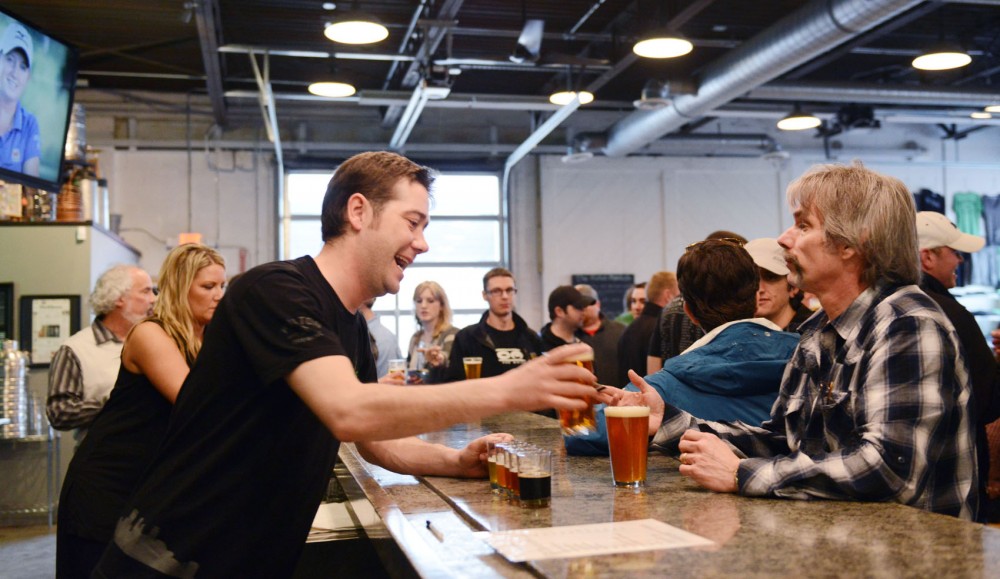Beer enthusiasts of Minnesota have been congregating at a more serious watering hole in recent years: the state Capitol.
A recent brewing boom in Minneapolis has led to more competition among craft brewers, but also collaboration as breweries fight together for more craft beer-friendly legislation in the face of restrictive state and city laws.
After a major victory in 2011, when brewery owners lobbied to allow onsite beer sales, the industry has exploded across the city and state.
Since 2010, 35 breweries have opened statewide, eight of which are housed in Minneapolis, according to the Associated Press.
Now, owners are again working together, but this time it’s to raise a limit on the sale of growlers, or 64-ounce jugs of beer.
Currently, breweries can only sell 3,500 barrels annually, but owners say that number is far too low, and they’re lobbying to raise the threshold to 20,000.
A bill has been included in a package of liquor-related legislation and will be considered later this session.
Two major proponents for the measure spoke last week at Republic bar at Seven Corners as part of an annual brewing forum hosted by the West Bank Brewing Association, a University of Minnesota student group.
Owners of Indeed and Fulton breweries said growlers are an essential part of their revenue stream.
Indeed’s Tom Whisenand and Fulton’s Ryan Petz said they joined with breweries across the state to form the “Save the Growler” campaign, which drew support from Minneapolis Mayor R.T. Rybak, a craft brew enthusiast.
The two owners also talked about the impact of the 2011 “Surly bill,” which allowed for selling beer at breweries and was nicknamed after Brooklyn Center-based Surly Brewing, which spearheaded the efforts.
“It had a huge impact on our brewery,” Whisenand said. “All of a sudden that law changes, and people can not only buy a pint but can also make a connection with us.”
Petz said he quit his job to pursue his dream of opening a brewery, and without the taproom bill, Fulton may have gone under.
“It was really tough to grow and make a living before the taproom bill,” he said.
Dominick Grande, a University law school student and WBBA member, said Fulton was the first taproom opened in Minneapolis while Indeed was the first brewery able to design its headquarters with the taproom in mind.
On Thursday, the two owners said the lobbying collaboration is an example of the camaraderie felt among craft breweries in Minneapolis.
Although the craft breweries in the city are competitors, Petz said their joint efforts at the state Capitol and City Hall fight for the common interests of craft brewers.
“We think of ourselves as a small part of a large macro-movement,” Petz said.
Whisenand said any competition is less about business and more about competing to make the best-quality beer, which is what’s best for the customer.
“It’s the whole reason we got into this business,” he said. “It’s our common goal to make great beer.”
Russell Squire, another WBBA member and University law school student, said he loves the friendly competition among the city’s craft brewers.
“Technically we consider these guys competitors because they’re both making craft beer, but there’s a real communal atmosphere, too,” he said.
Whisenand said new breweries add to the city’s beer culture, and he’s more than willing to lend a hand in helping them open, even if they’re nearby, like 612 Brew and Dangerous Man Brewing, which both opened recently.
Before Dangerous Man could open, the brewery had to work with the city to overturn an old ordinance that banned serving alcohol near churches.
Petz said he often sees people coming from other breweries to Fulton, and he encourages that type of brewery hopping.
“It’s pretty cool when someone bikes over to our taproom from Dangerous Man or Indeed,” he said.
The city’s beer culture will continue to develop thanks to recent and upcoming legislation, Petz said. As craft brewing becomes less of a novelty, he said, people are craving better quality beer.
“We’re at a point where it’s not a quirky new thing,” he said. “Everyone knows about it.”
Despite booming business over the past year at both breweries, both Petz and Whisenand said their breweries are about producing a quality product rather than making huge profits. Both breweries contribute a portion of their profits to charities.
“I wouldn’t want to get into business just to make money, as stupid as that sounds,” Whisenand said.








